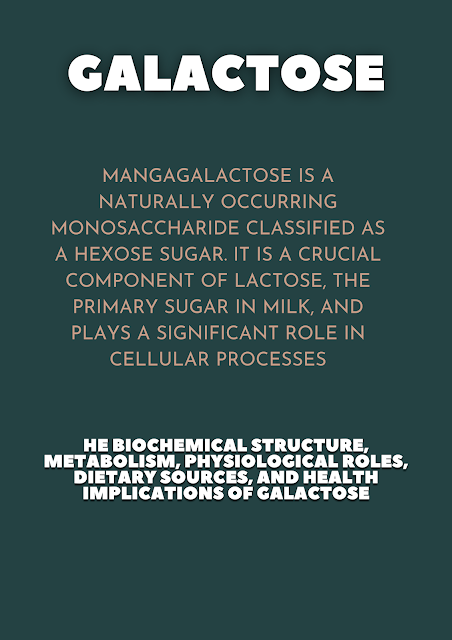Galactose
Introduction
Galactose is a naturally occurring monosaccharide classified as a hexose sugar. It is a crucial component of lactose, the primary sugar in milk, and plays a significant role in cellular processes. Unlike glucose, galactose has a distinct metabolic pathway, making it essential for energy production and biosynthetic functions.
Chemical Structure and Properties
Galactose (C6H12O6) is an aldose sugar, meaning it has an aldehyde functional group. Its key characteristics include:
Structural Similarity to Glucose: Galactose and glucose are epimers, differing only at the fourth carbon atom.
Solubility: Highly water-soluble due to its hydroxyl (-OH) groups.
Forms: Exists in both open-chain and cyclic (pyranose and furanose) forms in solution.
Metabolism of Galactose
Galactose metabolism occurs primarily in the liver through the Leloir pathway, consisting of three key enzymatic steps:
Galactokinase (GALK): Phosphorylates galactose to galactose-1-phosphate.
Galactose-1-phosphate uridylyltransferase (GALT): Converts galactose-1-phosphate into UDP-galactose by exchanging a uridyl group with UDP-glucose.
UDP-galactose 4-epimerase (GALE): Converts UDP-galactose into UDP-glucose, which then enters glycolysis or glycogenesis.
Physiological Functions of Galactose
Energy Production: Galactose contributes to ATP generation through glycolysis and the citric acid cycle.
Biosynthesis of Glycoproteins and Glycolipids: Essential for cell membrane integrity and signaling.
Brain Development: Galactose is vital for synthesizing cerebrosides and gangliosides, key components of neural tissue.
Lactose Formation: In mammary glands, UDP-galactose combines with glucose to form lactose in milk.
Dietary Sources of Galactose
Dairy Products: Milk, cheese, and yogurt contain lactose, which is broken down into galactose and glucose.
Legumes and Fruits: Small amounts are found in beans, cherries, and bananas.
Processed Foods: Some baked goods and artificial sweeteners contain galactose derivatives.
Health Implications of Galactose
1. Galactosemia: A Genetic Disorder
Galactosemia is a rare inherited metabolic disorder caused by enzyme deficiencies in the Leloir pathway, leading to toxic accumulation of galactose or its metabolites. Types include:
Type I (Classic Galactosemia): Deficiency in GALT, causing severe symptoms such as liver damage, cataracts, and developmental delays.
Type II (Galactokinase Deficiency): Primarily results in cataracts due to galactitol accumulation.
Type III (UDP-Galactose Epimerase Deficiency): Variable symptoms affecting metabolism and nervous system function.
2. Galactose and Lactose Intolerance
Lactose intolerance occurs when lactase enzyme deficiency prevents lactose digestion, leading to gastrointestinal discomfort. Since lactose contains galactose, individuals with intolerance must moderate dairy intake.
3. Galactose and Brain Health
Studies suggest galactose plays a role in cognitive functions due to its involvement in neural glycolipids.
However, excessive intake may contribute to oxidative stress and neurodegenerative diseases (Neurobiology of Aging, 2017).
4. Galactose and Aging
Animal studies indicate that chronic galactose exposure accelerates aging due to oxidative damage (Free Radical Biology and Medicine, 2015).
Dietary moderation is recommended to mitigate potential long-term effects.
Habits That Can Accelerate the Aging Process
Recommended Intake and Safety
No official daily requirement for galactose exists, but individuals with galactosemia must follow a strict galactose-free diet.
Moderate intake from natural sources is generally safe for healthy individuals.
Conclusion
Galactose is an essential sugar with significant metabolic and physiological functions. While it is a key nutrient in normal metabolism, excessive intake or enzyme deficiencies can lead to health complications. Understanding its role and maintaining balanced dietary consumption can support overall well-being.
References
Berry, G. T. (2018). "Galactose metabolism and its disorders." Pediatric Endocrinology.
Shaw, B. F., et al. (2017). "The impact of galactose on oxidative stress and aging." Neurobiology of Aging.
Wei, Y., et al. (2015). "Galactose toxicity and its implications in aging." Free Radical Biology and Medicine.
